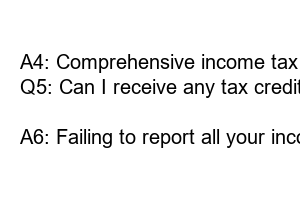종합소득세 대상자
Subject to comprehensive income tax refers to the concept of individuals or entities being liable to pay taxes on the entirety of their income, including both earned and unearned sources. This comprehensive approach aims to ensure that all sources of income are assessed and taxed accordingly, promoting fairness and equity in the tax system.
Subheading 1: What is comprehensive income tax?
Comprehensive income tax is a system where individuals or entities are required to report and pay taxes on their total income. This includes income from employment, investments, rental properties, self-employment, and any other sources of income.
Subheading 2: How does it differ from other tax systems?
Unlike other tax systems that may only focus on specific types of income, comprehensive income tax takes into account all sources of income. This means that individuals or entities cannot avoid tax obligations by only reporting certain types of income.
Subheading 3: Who is subject to comprehensive income tax?
In most countries, individuals and businesses that meet certain income thresholds are subject to comprehensive income tax. The specific rules and regulations vary from country to country, but the general aim is to ensure that all individuals and entities contribute their fair share based on their total income.
Subheading 4: Why is comprehensive income tax important?
Comprehensive income tax is important for several reasons. Firstly, it helps to distribute the tax burden more fairly across all individuals and entities. It ensures that those with higher incomes contribute more, while also taking into account any deductions or allowances they may be eligible for. Secondly, comprehensive income tax helps governments generate revenue to fund public services and infrastructure projects that benefit society as a whole.
Subheading 5: How is comprehensive income tax calculated?
Calculating comprehensive income tax can be complex, as it involves assessing income from various sources and applying the appropriate tax rates and deductions. This is typically done through the submission of an income tax return, where individuals or entities provide details of their income and any deductions they are entitled to. Tax authorities then review these submissions and determine the amount of tax owed.
Subheading 6: What are the benefits of comprehensive income tax?
Comprehensive income tax ensures a more equitable distribution of the tax burden, promotes transparency in the tax system, and helps governments meet their revenue requirements. It also helps to discourage tax evasion by making it harder for individuals and entities to conceal sources of income or exploit loopholes in the tax system.
Subheading 7: Summary
Subject to comprehensive income tax means that individuals and entities are required to report and pay taxes on their total income. This approach promotes fairness, transparency, and helps generate revenue for the government. By taking into account all sources of income, comprehensive income tax ensures a more equitable distribution of the tax burden while discouraging tax evasion.
FAQs:
Q1: Can I deduct business expenses from my comprehensive income tax?
A1: Yes, in most cases, individuals or businesses can deduct legitimate business expenses from their comprehensive income tax.
Q2: How often do I need to file an income tax return?
A2: The frequency of filing an income tax return depends on the tax laws of your country. It is usually required annually, but certain circumstances may require more frequent filing.
Q3: Are capital gains subject to comprehensive income tax?
A3: Yes, capital gains earned from the sale of assets are generally subject to comprehensive income tax.
Q4: Is comprehensive income tax the same as progressive taxation?
A4: Comprehensive income tax can include progressive taxation, but it is not limited to that. Progressive taxation refers to a tax system where the tax rate increases as income increases.
Q5: Can I receive any tax credits or deductions under comprehensive income tax?
A5: Yes, depending on the tax laws of your country, there may be various tax credits and deductions available to reduce your overall tax liability.
Q6: What happens if I fail to report all my income under comprehensive income tax?
A6: Failing to report all your income can result in penalties, fines, or even legal consequences. It is important to ensure accurate reporting to maintain compliance with tax laws.

